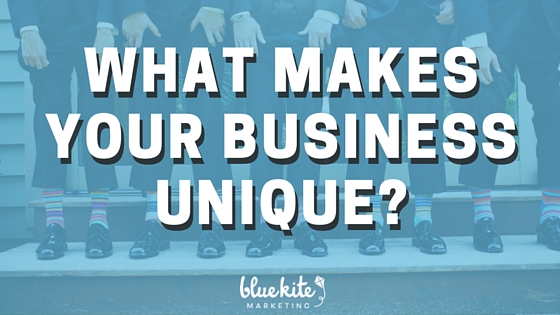Earlier this week, I talked about the reasons businesses shouldn’t replicate their competitor’s marketing efforts.
While that’s certainly problematic, there’s often a bigger underlying issue — they don’t know how to differentiate their business.
Far too often, companies see the success of their competitors and want to copy it.
Remember when Groupon came on the scene? After they achieved massive success, hundreds of “me-too” companies tried to replicate the model and grab a piece of the pie. With the exception of one or two companies, most of Groupon’s competitors failed.
Why?
They didn’t differentiate themselves enough.
The reality is that there are likely dozens, or maybe even hundreds, of competitors who do exactly what you do. Copying your competitors will only make yourself look more like the very businesses you are trying to beat. And, you’ll create situation where you’re more likely to compete on price instead of value, which is not a good place to be.
Instead of looking for ways to imitate your competitors, you should find ways to differentiate your business and give people a reason to choose YOU.
Admittedly, trying to stand out or be different can be incredibly hard or even scary. After all, society has taught us the value of fitting in and being popular.
But in business, you need to throw those ideals out the window and embrace your differences if you want to be successful.
How to Differentiate from the Competition
I call this your special sauce or your mojo. It’s the one thing that makes your company incredibly unique and it’s what should come to mind when people think of your company.
So, how do you uncover your special sauce? Here are some questions that can help do that:
1. What makes you special?
When looking at your competitors, what makes you different from them? Do you offer something they don’t? Is your process unique? Look for ways your company stands out.
A new restaurant in Nashville called The Slider House specializes in mini burgers and hot dogs. Although there are plenty of burger joints and places that sell sliders, The Slider House does something different — they only sell beer in cans.
The beer is served in branded koozies that patrons get to keep. The restaurant recycles the cans and gives the proceeds to charities that benefit the environment.
How many burger joints can say that?
This one small thing is a big differentiator that makes The Slider House stand out. See how that works?
2. What do you stand for?
Another way to differentiate your business is to talk about your core values. In other words, this is what you believe as a company.
For example, responsiveness is a core value for a law firm client of mine. That’s why they guarantee to call clients and prospects back within 24 hours. It’s clear that the entire firm stands behind this because clients regularly praise the firm for how they quickly attorneys responded to phone calls and emails and how important it was to always know the status of their case.
Think about what your company stands for? What would you draw a line in the sand for?
3. Who do you uniquely serve?
Another way to stand out in a competitive market is to serve a very specific niche.
For instance, if you’re a Realtor, instead of only focusing on an area of town you could work specifically with urban professionals who are relocating to the city. Or, you could work with environmentally conscious buyers who want LEED-certified homes.
When you narrow your niche, you’re able to better cater your services (and your marketing) to attract the right people.
4.
What pain points are not being addressed?
If you look at your industry, you might find some customer needs or frustrations that are not being served.
For example, a carpet cleaning company might discover that no one in their market offers same-day service. Or, a medical office could offer extended or weekend hours for busy professionals.
Talk to your clients and ask them what they wish you offered. You might just uncover some important ways to expand your services in a way that helps you stand out from your competitors.
5. What’s your story?
Sometimes, what can make a company unique is their story. Maybe it’s the story behind your company’s name or how the business was started.
That’s the case for 1907 Apparel in Nashville. The name of the company was chosen because that year holds a special significance in the company founder’s life. Her story is so powerful; you need to check it out for yourself.
Because of the founder’s story, the mission of 1907 Apparel is to help people tell their own stories by creating custom t-shirts with the number or year that’s meaningful to customers. On top of that, the company gives seven percent of profits to charities that help empower others.
A compelling story can make all the difference between just another t-shirt company and a meaningful brand.
What about you?
Do you know what makes your company special? How do you stand out from your competitors? If you’re struggling with this, let me know in the comments and we’ll talk it through.





12 replies on “5 Ways to Differentiate Your Business”
Exemplary post, Laura! Every suggestion [and example] you’ve shared is a great way to differentiate your business and yourself from others in your same niche/industry.
” … you’ll create a situation where you’re more likely to compete on price instead of value” OUCH. I see this on a daily basis, especially with biz coaches and consultants. Yes, pricing is important. But if that’s the ONLY thing that sets you apart from your competitors, you’re in deep bandini!
Love what The Slider House is doing with their marketing — fun! (And super savvy)
Thanks for the kind words, Melanie! You’re right, pricing is important, but unless you want to be Walmart, you shouldn’t compete on price alone. There is always someone who is willing to go cheaper.
And yes, isn’t The Slider House’s stuff great? I was impressed when we went there. Very smart marketing indeed!
Hi Laura,
Really great points here … makes me want to hit the Slider House, too bad it’s out of my range 😉
I completely agree and this is a great way to direct the conversation when you first meet with a client.
Great stuff. Keep it coming!
I think you should make a special trip to Nashville for The Slider House, Craig! It would be EPIC!!! 🙂
Yes, differentiation rules. It’s time to start embracing our uniqueness, no?
Maybe I’ll be close if I make the next Social Slam.
It would be AWESOME if you made it to Social Slam next year! I always make plans to go. 🙂
Hi Laura,
I agree with you — differentiation is the key (especially in the online world) to what I call “standing out in a sea of sameness”. People don’t share stories or recommend companies if they’re boring or average.
It’s amazing how seemingly small things (like what The Slider House is doing) make a big difference in attracting attention. And they often don’t cost much money to implement.
Great post with practical advice (as always) — passing it along!
P.S. Love the story of 1907 Apparel. I got goosebumps reading the history and mission behind the company.
You’re right, Sarah – people don’t talk about boring companies! Differentiation is what gives you the edge to stand out in the marketplace.
And yes, isn’t 1907 Apparel great? It just makes you want to buy their stuff because their story is so darn compelling. THAT is what good branding and differentiation looks like!
Hi Laura,
I’m so glad you didn’t go right to the #1 most obvious differentiator: “service”. It just kills me. “What makes you different than your competition?” “Our service!”
If everyone says service (and everyone does), then no one can.
I’m a firm believer *against* selling on price in the insurance market (my field, as you know), since it turns our product into a commodity, and devalues our role as agents (and have written a popular article on the topic: “How Spreadsheeting Ruined Long Term Care”, but I’m an even bigger believer in something I call “Your Number”.
An example of this is “1907 Apparel”. In my piece, “What’s Your Number?” I ask every business to think of that one number, letter, abbreviation, or symbol that communicates with your customers in shorthand who you are as a brand. What’s that simple language that you and your customers both understand that instantly conveys an important message?
For many insurance carriers, it’s an AM Best rating (“A+”). For McDonald’s it might be “1 Billion Served”). For many in the financial services industry it will be a suffix behind their name (“ChFC” or “CFP”). Nowadays many turn to “social proof” to accomplish the same effect.
Cheers!
Hi Stephen,
You’re right – service is a hard way to differentiate. I think it can be done, but you have to be so over the top and remarkable in this area for it to work (think Zappos or Nordstrom).
I agree differentiating on price can also be tricky – especially if you do that on the bottom end. There will always be someone who’s willing to go lower. I think your number concept makes a lot of sense. The bottom line is that companies need to find their differentiator and own it – however they do that!
Laura
Hi Laura,
You bring up a good point: I actually think companies can find success differentiating on price on the upper end more easily than racing to the bottom in some cases. Not only have I cited evidence for this in my 2 “Neuromarketing” articles, but I can think of a few LTCi carriers who make no bones about being higher-priced– they use this very fact not as a negative but as an indicator of “quality”.
Agreed. I think you can differentiate on price on the upper end, but it’s still not really about price. It’s more about quality and experience, I would think.